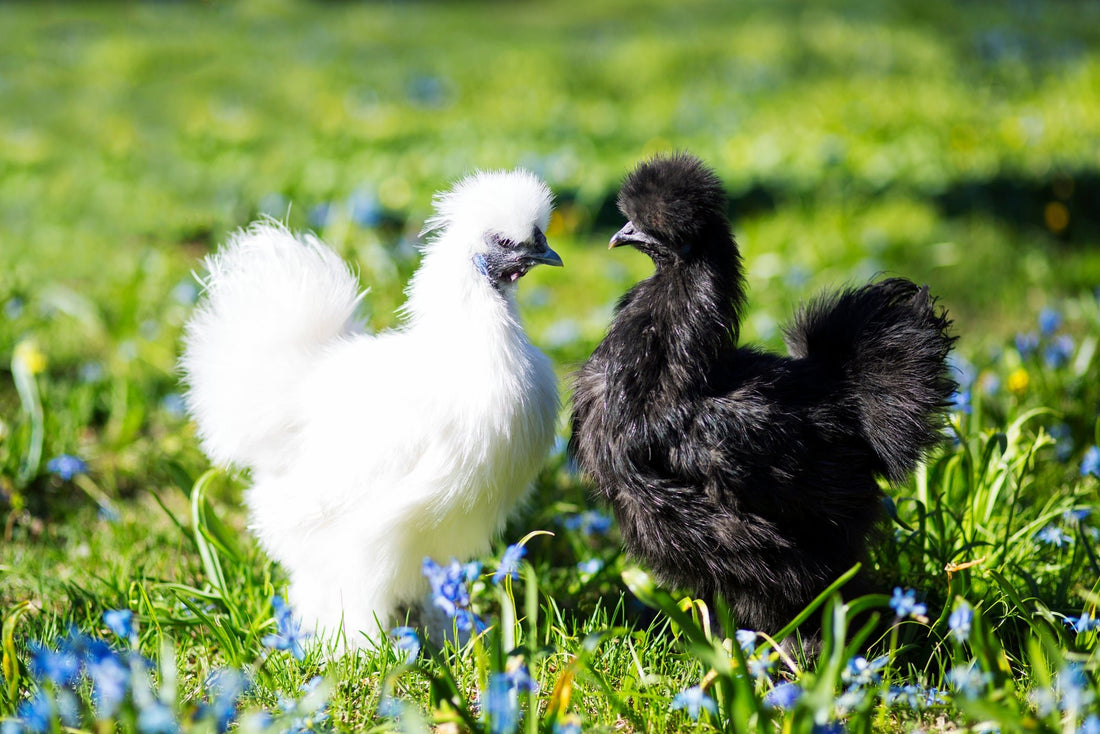Silkie chickens are a beloved and fascinating breed of chicken that have become increasingly popular among backyard chicken keepers. One question that many people have about Silkies is whether they are good egg layers. In this blog post, we'll explore the question of whether Silkies are good egg layers, including their egg production, egg size, and other factors that impact their ability to lay eggs.
Silkie chickens are a unique breed of chicken known for their soft, fluffy feathers, gentle personalities, and distinctive appearance. They are a bantam breed, meaning they are smaller than standard breeds of chickens. Silkies have five toes instead of the usual four, and their feathers lack barbs, which gives them a unique, fur-like appearance. They come in a variety of colors, including white, black, blue, buff, and gray.
Silkie chickens are popular among backyard chicken keepers for their beauty, companionship, and docile nature. They make great pets and are a favorite among children. While they are not as commonly used for egg production as other breeds of chickens, many people wonder whether they are good egg layers.
Egg Production
Silkie chickens are not known for their egg-laying ability. While they are capable of laying eggs, they do not produce as many eggs as other breeds of chickens. On average, Silkies lay around three eggs per week, which is significantly less than the five to seven eggs per week that many other breeds lay. Some Silkies may lay more or less frequently than this, depending on a variety of factors.
Egg Size
Another factor to consider when evaluating Silkie chickens as egg layers is the size of their eggs. Silkies are known for laying small eggs, which can be a disadvantage for those who are looking for larger eggs. On average, Silkie eggs weigh around 1.5 to 2 ounces,which is about half the size of a standard chicken egg. However, it's important to note that Silkie eggs are still perfectly edible and delicious, and their smaller size can be an advantage for those who want to use them in recipes that call for smaller amounts of eggs.
Other Factors Affecting Egg Production
While Silkies may not be the best egg layers in terms of quantity and size, there are other factors that can impact their ability to lay eggs. For example, nutrition, environment, and genetics can all play a role in a Silkie's egg production.
Nutrition: Like all chickens, Silkies require a balanced diet that includes a variety of nutrients to stay healthy and lay eggs. It's important to provide them with a high-quality feed that contains the appropriate levels of protein, calcium, and other essential nutrients. Feeding your Silkies a diet that is lacking in these nutrients can lead to poor egg production and other health problems.
Environment: The environment in which your Silkies live can also impact their egg production. Silkies are sensitive to extreme temperatures, so it's important to keep their coop and run at a comfortable temperature. They also require access to fresh water and clean bedding to stay healthy and lay eggs.
Genetics: Finally, genetics can play a role in a Silkie's egg production. While Silkies are not known for their egg-laying ability, there are some breeders who specialize in breeding Silkies for improved egg production. If you're interested in raising Silkies for their eggs, it's important to look for a reputable breeder who has a history of breeding for egg production.
Benefits of Raising Silkie Chickens
While Silkies may not be the best egg layers, there are many other benefits to raising these unique and charming birds. Here are just a few of the reasons why you might consider adding Silkies to your backyard flock:
Companionship: Silkies are known for their gentle and friendly personalities, which make them great pets and companions. They are also a favorite among children due to their soft, fluffy feathers and docile nature.
Beauty: With their unique appearance and soft, fluffy feathers, Silkies are often considered one of the most beautiful breeds of chicken. They come in a variety of colors, and their feathers have a unique, fur-like texture that is unlike any other breed.
Broodiness: Silkies are known for their broodiness, which means they have a strong instinct to sit on eggs and hatch chicks. This can be an advantage for those who want to hatch their own chicks without the need for an incubator.
Hardy: Despite their delicate appearance, Silkies are actually quite hardy and can tolerate a range of temperatures and climates. They are also resistant to many common chicken diseases.
While Silkie chickens may not be the best egg layers in terms of quantity and size, they have many other qualities that make them a great addition to any backyard flock. With their unique appearance, friendly personalities, and ability to hatch chicks, Silkies are a beloved and fascinating breed of chicken that are sure to bring joy to any chicken enthusiast. So if you're considering adding Silkies to your flock, don't let their egg-laying ability hold you back - there are many other reasons to love these charming birds!

